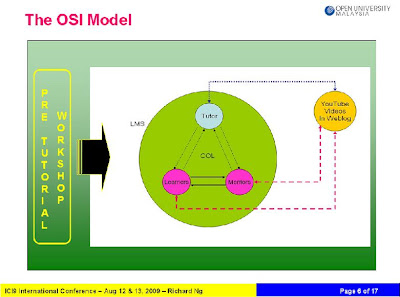The video clips of the presentation by the author on OSI model during the ICI International conference held in KL from Aug 12 to 13 2009 can be viewed as follows:

Video Clips Part: 1
Video Clips Part 2:
Learn Math the easy way ... Specially prepared by Associate Professor Dr Richard Ng
 The OSI Model used by Richard Ng to teach Math
The OSI Model used by Richard Ng to teach Math Richard Ng conducting the Pre-Tutorial workshop under the OSI Model in KL
Richard Ng conducting the Pre-Tutorial workshop under the OSI Model in KL An Afghan girl blows a bubble gum in Kabul January 23, 2003. REUTERS/Erik de Castro/FilesBy Julie Steenhuysen
An Afghan girl blows a bubble gum in Kabul January 23, 2003. REUTERS/Erik de Castro/FilesBy Julie Steenhuysen OUM entourage to AAOU 2008 conference was led by Prof. Tan Sri Dr. Anuwar Ali (fifth from right)
OUM entourage to AAOU 2008 conference was led by Prof. Tan Sri Dr. Anuwar Ali (fifth from right) Prof. Tan Sri Dr. Anuwar Ali was one of the key note speakers at the conference
Prof. Tan Sri Dr. Anuwar Ali was one of the key note speakers at the conference
 The winning presentation by Prof. Mansor Fadzil, Senior VP of OUM
The winning presentation by Prof. Mansor Fadzil, Senior VP of OUM Puan Kamariah, Registrar of OUM, received the silver medal on behalf of OUM
Puan Kamariah, Registrar of OUM, received the silver medal on behalf of OUM The winning team members (from left): Richard Ng, Prof. Ramli, Siti Farina, Prof. Latifah and Prof. Abtar
The winning team members (from left): Richard Ng, Prof. Ramli, Siti Farina, Prof. Latifah and Prof. Abtar The Silver Medal
The Silver Medal The certificate awarded to team members
The certificate awarded to team members  The OSI Model of learning Mathematics
The OSI Model of learning Mathematics
 The Skyblue PMP is as big as the size of the palm measuring 3cm by 5cm
The Skyblue PMP is as big as the size of the palm measuring 3cm by 5cm I downloaded one of my video clips and play it with this gadget. It was superb.
I downloaded one of my video clips and play it with this gadget. It was superb. I tested the video on this gadget. In the background is my PC which I am running the YouTube video.
I tested the video on this gadget. In the background is my PC which I am running the YouTube video. Silver Medalist Richard Ng with his certificate and medal won at the AAOU 2008 International Conference in Tian Jin, China
Silver Medalist Richard Ng with his certificate and medal won at the AAOU 2008 International Conference in Tian Jin, China The silver medal won
The silver medal won The certificate awarded to members of the project team
The certificate awarded to members of the project team The write-up as appeared in the Sun paper on Dec 2, 2008 pg 20
The write-up as appeared in the Sun paper on Dec 2, 2008 pg 20
 Blog Matematik Pengurusan yang telah dilayari sebanyak 2255 kali dalam tempoh 2 bulan
Blog Matematik Pengurusan yang telah dilayari sebanyak 2255 kali dalam tempoh 2 bulan
 The OUM delegation were all smiles when the university won the Silver Medal Best Paper Award for e-Mathematics during the 22nd Asian Association of Open Universities (AAOU) Annual Conference held recently in Tianjin, China. The paper was presented by Prof Mansor Fadzil, Senior Vice President and was co-written by Dr. Richard Ng, Prof Abtar Kaur, Prof Latifah Abdol Latif, Ramli Bahroom and Siti Farina Sheilh Mohamed. The fact that the paper was on e-Mathematics and their impact on students online participation and final exam score, clearly indicates that OUM’s e-learning in mathematics are of international standards.
The OUM delegation were all smiles when the university won the Silver Medal Best Paper Award for e-Mathematics during the 22nd Asian Association of Open Universities (AAOU) Annual Conference held recently in Tianjin, China. The paper was presented by Prof Mansor Fadzil, Senior Vice President and was co-written by Dr. Richard Ng, Prof Abtar Kaur, Prof Latifah Abdol Latif, Ramli Bahroom and Siti Farina Sheilh Mohamed. The fact that the paper was on e-Mathematics and their impact on students online participation and final exam score, clearly indicates that OUM’s e-learning in mathematics are of international standards.